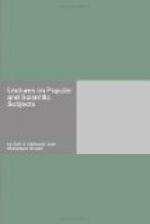general, prompt us to a wiser study of our social
wants, and the means at our command for further social
improvement; which we might prosecute with less and
less recourse to the stimulant virtues of malt in such
forms as whisky. And this we may do, if we limit
our indulgence in it to the less potent form of it
in beer, which, while it is calculated to quench man’s
bodily thirst, is equally calculated to quicken his
mental. How much it contributes to allay the
former, and how many thirsty souls are refreshed by
it, we may estimate from the statistics of the sale
of it furnished by a single firm in London. I
refer to the firm of the Messrs. Foster, Brook Street,
who are friends of my own, and to whom I should be
glad to refer all who may be in want of a wholesome
beer, for theirs is so good and genuine. The
Messrs. Foster are among the most extensive bottlers
and exporters in the country; and I find from the information
they have kindly supplied me, that the beer bottled
by them for export purposes during the year 1874 was
6000 butts, of 108 gallons each; that their contracts
for the supply of bottles during that period represented
25,000 gross, or 5,040,000 bottles, which, if laid
end to end, would extend to about 1000 miles; and
that their accounts with Bass & Co. alone for that
term amounted to L150,000. All, from the highest
to the lowest, drink beer in England; and when unadulterated
and taken in moderation, it is one of the most healthful
beverages of which the human being, man or woman,
can partake.
Though I have only partially gone over the ground
contemplated at first, I feel I must now draw to a
conclusion, which I am the less indisposed to do,
as I think in what I have said I have pretty fairly
set before you the wonderful properties latent in
a basin of hodge-podge. For it is a habit of
mine, which I have sought to indulge on the present
occasion, to analyse every subject to which my attention
is directed, and in which I feel interest, before
I can make up my mind as to the proper significance
and importance of the whole compound. Thus, for
instance, set a dish of hodge-podge before me; it
does not satisfy me to be told that it is only a basin
of broth, and that it is wholesome fare; I must, as
I have now been doing in a way, resolve the compound
into its elements, see these in other and wider relations,
and refer them mentally to their rank and standing
in the larger world of the economy of nature and of
social existence. I am always asking “What’s
intilt?” and am never satisfied, any more than
the English tourist, with a bare enumeration:
I must subject the factors included to rational inspection,
and watch their play and weigh their worth in connection
with interests more general.




